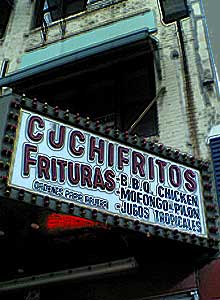|
|
|
|
|
|
|
|
| Sheila Black At the Embajada at 107th and Amsterdam When we felt weak we ate monfongo, the high-piled sandcastle plates of plantain mashed with pork cracklings. On Sunday mornings the plantanos maduros like coins of Spanish gold—that starched sweetness. And we drank café con leche anytime at all, devouring the small pale slices of fried bread that came on the side. In winter always, ropa vieja—old clothes—the shredded meat mixed with the gravy of peppers, onions, tomatoes, sandwiches Cubanos, flat and and steaming, marked with the iron bars of the grille. We ate hung-over and lovesick. We ate when they were still hosing the blood- from-the-night-before from the sidewalks. We ate beside the old married couples, the suicidal teens, the gang-bangers, and drunks. We ate to excess; we ate without noticing. We ate as we were splitting up—the table partitioned with our terrible endings, a sudden arcana, the stretched silences. We ate as we had once eaten when it was all new— in thrall to the city—the burst hydrants, the dazzled sluicing of a world. We ate as the girl behind the counter wept unceasing—the rent had gone up; they could no longer afford the lease. Flan with burnt caramel spilling around the saucer at the bottom, black beans and yellow rice washed down with the beer from the back of the menu, ice-cold bottles of El Presidente—the dictator with his white moustaches, the benevolent but menacing glimmer in his eye. We ate ourselves into history, plate after plate, like the great paintings in the museums— grease gilded with achiote, the bone starch of yucca, the roots and the organs dismembered. We ate carelessly; we ate with relish; as our lives turned and burned, we ordered, we ate. |
 |